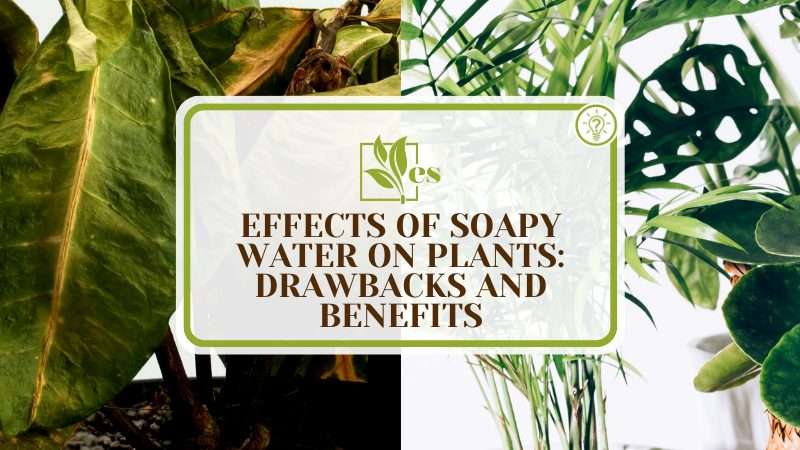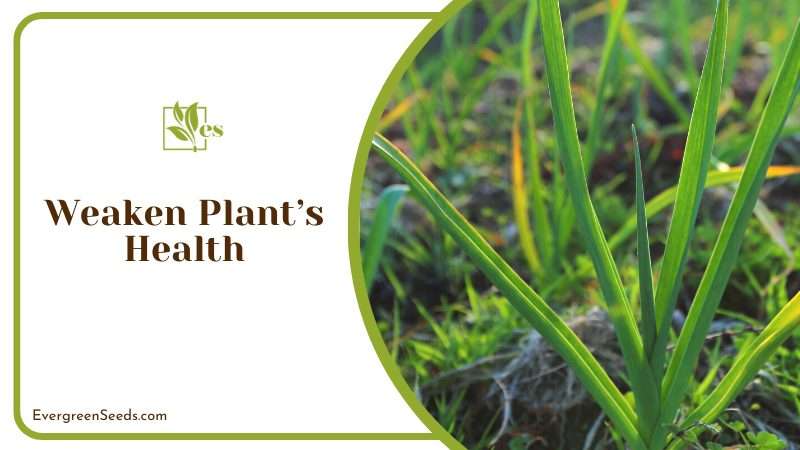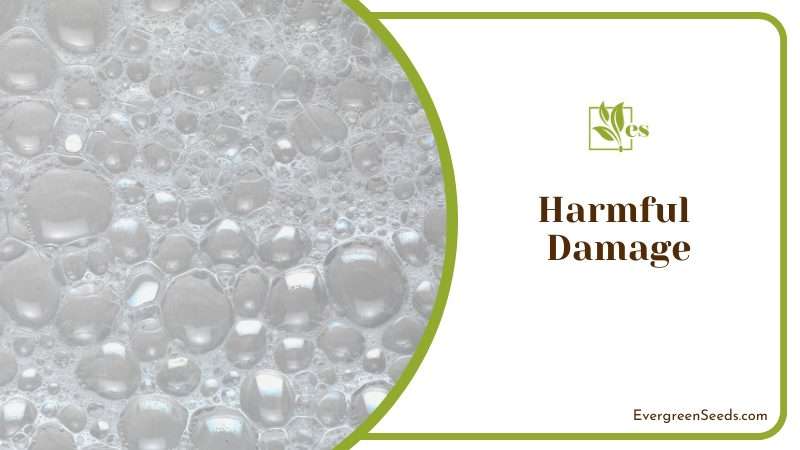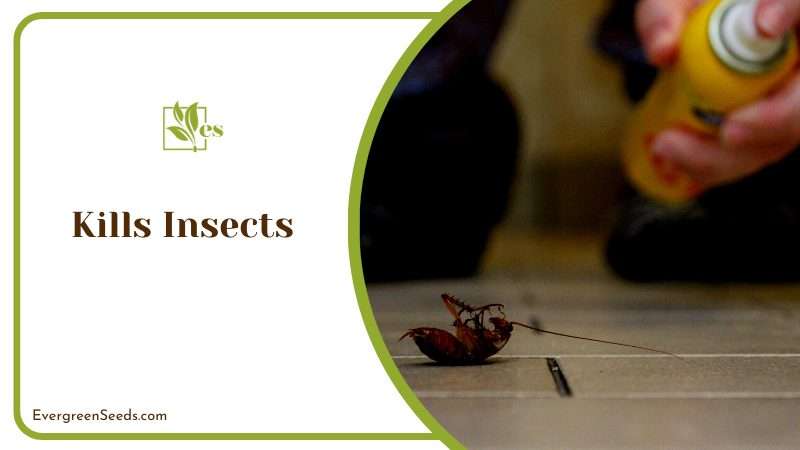Effects of soapy water on plants are a fact that every sensible gardener should know. Soapy solution is a blend of soap or powder detergent in water and is hugely used now in the garden due to its ecological benefits.

However, one must be keen and sure about the ways that they would use this solution, of course not in a harmful way, because the excess of it would have prolonged damages.
Our experts have accumulated all the important facts about using soap diluted in water on your beloved plants.
JUMP TO TOPIC
What Are The Effects of Soapy Water On Plants?
💥 The effects of soapy water on plants is to weaken the plant’s health, and to start burning the leaves, due to the abundant chemicals found in this solution. Lastly, this solution it will start to promote different diseases to the plant.
Any ready-to-use commercial insecticidal soaps from good brands if you wonder what soap is safe for plants as they are made specially keeping in mind the safety of plants while it is capable of killing insects.
Laundry detergent and dish soap which is powdered, are not safe for the plants due to containing intense ingredients, but dishwashing liquid doesn’t harm plants.
– Weaken Plant’s Health
The first one is preservatives in soaps and detergents, which can cause damage to your plants. Bleach has a huge amount of sodium, which can destroy the plant’s capacity to imbibe vital nutrients, and plenty of home disinfectants and detergents contain a high volume of chlorine that drastically impacts plants at the time of gathering on the roots of the plants or leaves.

However, chemical elements like nitrogen, phosphorus, and potassium are useful for your garden, and you should check the soapy solution ingredients before applying them to your plants.
– Burning the Leaves
Using water that has some soap can cause damage to your plant’s leaves too. If you use homemade soap spray, which is usually made of liquid dish soap, to kill insects in your garden, it can destroy the external waxy coating of the plant’s leaves as it carries chemicals that fight oils and fats.
However, you can use commercial insecticidal soaps instead of homemade ones because they are made to be secured on plants while fighting against insects, bugs, or pests.
– Promotes Diseases
It helps pathogens to survive, which can cause disease in plants. However, chemicals of soap and water from home cleaners destroy bacteria or fungi, which are pathogens.
Still, as disinfectants in soap solution are diluted, they cannot kill all pathogens. When the pathogens touch the fleshy and other edible parts of your plants, they can be the reason for creating diseases for the caretaker or eater of the plants.
– Harmful Damage
Water with a little soap or detergent won’t kill your plant roots, but it will cause great damage which would be harmful to the plant in the long run. Instead, due to containing a wetting agent, this type of water gets penetrated in the depth with mild effects of soapy water on soil.

Soap water has little effect on soil regardless of its type, but where the soap water gets provided again and again without the chance of flowing gray water, the place becomes unsuitable for tree plantation.
How Can You Use Soap Water In a Good Way?
You can use soap solution in a good way, by recycling the water, and water conservation would be guaranteed. It would provide small doses of nutrients to the plant, and it would even start killing the pests and the insects found in the plant.
You can also make safe solutions for plants, and you will need only dish soap and water. When you want to make a safe soap at home, you have to mix just two teaspoons of dish soap with one pint of water for a two percent of soap solution.
Plenty of people are now reusing water that has some soap and using it on their garden plants because of its tremendous benefits. Nowadays, many experts and organizations are encouraging the practice of using soapy solutions on plants because of its recycling benefits, but we have to keep in mind that there are some serious negative effects of using soap water on your plants are also a fact.
– Recycle the Water
The first benefit of it is the water bill gets reduced. A large garden demands so much water, and as water with soap content is a part of the recycling method, you can save a huge amount of money by watering your plants. The more your garden needs water, the more money you can save. You can also use tap water, purify it, and then recycle it.
Though you have to set up your filtration system by investing some money, the result will be satisfactory because the profit will be higher than the investment. However, keep in mind the cost of filtration system maintenance as well.
– Water Conservation Guaranteed
If you live in an area that is drought-prone or often faces water shortage, then using soap solution can be a great solution for you due to its feature of conserving water. Humans regularly produce a massive amount of wastewater, and your garden requires a constant water supply. If you can recycle the wastewater for non-drinkable utilization, you or your family will ensure conserving usable water for daily use like sanitary and dietary necessities.
– Provides Important Nutrients to Plants
Any type of chlorinated water is one that seems dangerous to some people, but it provides some important nutrients to your plants. Household wastewater contains macronutrients like nitrogen and phosphorus in large amounts, which assist your plants in growing healthy. Some soaps, like dawn dish soap, even have chloride, which is necessary for a plant’s healthy growth. Moreover, some soaps have potassium salt, an essential mineral for plants.
But you have to be careful to filter out detrimental chemicals and pathogens from this water you are going to use. Otherwise, soapy water will ruin your plants instead of helping them to grow.
– Kills Insects
Spraying this type of water on plants infected with bugs kills tiny and soft-bodied insects by piercing and liquefying the shielding wax layer of the insect, and they lose moisture which causes their death.

If you ask what bugs does soapy water kill, they can kill tiny insects with soft bodies, including Aphids, whiteflies, thrips, and mites. But hardy insects with large bodies, such as caterpillars, beetles, and Japanese beetles, aren’t usually affected by these types of water.
References
- (September 26, 2020). What is a soapy water?. Sage Advices.
Retrieved from https://sage-advices.com/what-is-a-soapy-water/ - https://extension.umn.edu/yar…/coming-clean-soap-garden….
- N. R. Kulabako, N.K.M. Ssonko and J. Kinobea. (September 2011). Greywater Characteristics and Reuse in Tower Gardens in Peri-Urban Areas – Experiences of Kawaala, Kampala, Uganda. Research Gate.
Retrieved from https://www.researchgate.net/publication/266288823_Greywater_Characteristics_and_Reuse_in_Tower_Gardens_in_Peri-Urban_Areas_-_Experiences_of_Kawaala_Kampala_Uganda - BOB MORRISGARDENING. June 23, 2011. Dish soap helps eliminate unwanted insects. Las Vegas Review-Journal.
Retrieved from https://www.reviewjournal.com/life/home-and-garden/dish-soap-helps-eliminate-unwanted-insects/ - Tracey Fitzgibbon. (Dec 16, 2022). Soapy water key to victory over fungus gnats. Albuquerque Journal.
Retrieved from https://www.abqjournal.com/2558017/soapy-water-key-to-victory-over-fungus-gnats.html - Nicole LeBoeuf-Little. (21 September, 2017). What Are the Effects of Soapy Water on Plants?. Garden Guides.
Retrieved from https://www.gardenguides.com/100190-effects-soapy-water-plants.html












